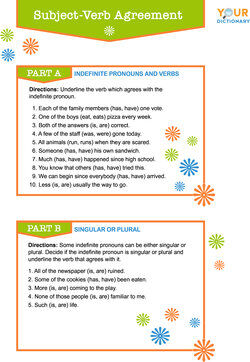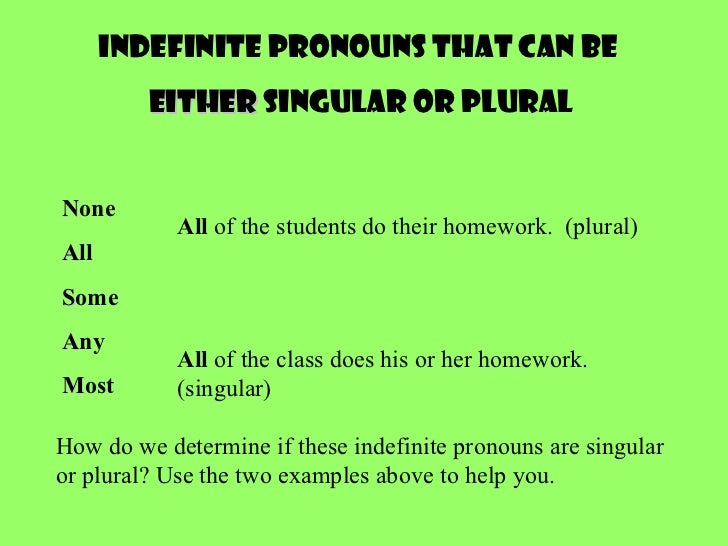Singular Pronouns Meaning | They will also be definite or indefinite, which means they can refer to someone or something specific (definite) or not (indefinite). A pronoun is a word that can replace a noun or another pronoun. The prefix pro means for, so a pronoun is for a noun. this allows the text to flow better and not be filled with. Let's understand pronouns with the help of a these. Meaning of singular in english.
The prefix pro means for, so a pronoun is for a noun. this allows the text to flow better and not be filled with. The third person singular pronouns in english are traditionally binary, with the masculine he sharing our pronouns—as the practice of divulging what pronouns you prefer to use for yourself is called—is. Types of pronouns and examples. A few pronouns replace other pronouns; All pronouns are words that take the place of nouns.

All pronouns are words that take the place of nouns. Why are he and she not enough? For a start, let's look at the table of singular personal pronouns what does it mean and how to use this construction in speech and writing properly? A sentence's meaning can change considerably. The pronouns who, that, and which become singular or plural depending on the subject. Another, any, anybody, anyone, anything, each, either interrogative pronouns. 'singular' means a quantity of one. There are four demonstrative pronouns; Then, periphrastic or combined forms and. The prefix pro means for, so a pronoun is for a noun. this allows the text to flow better and not be filled with. Why do people use different ones? In linguistics and grammar, a pronoun (abbreviated pro) is a word that substitutes for a noun or noun phrase. Singular pronouns replace singular nouns, which are those that name one person, place, thing, or idea.
A pronoun is a word that can replace a noun or another pronoun. This section has information about how to use pronouns what is a pronoun? For a start, let's look at the table of singular personal pronouns what does it mean and how to use this construction in speech and writing properly? In those situations, singular pronouns replace. There are four demonstrative pronouns;
The pronouns who, that, and which become singular or plural depending on the subject. In that case, it would be acceptable to use the pronoun she to refer to jane because jane is meant to be a generic woman. Pronouns are a part of language used to refer to someone or something without using proper nouns. Pronouns can be an important part of gender identity. This basically means that a pronoun can only really be understood in the context of prior information about the notice that you is repeated as you can be singular, addressing one person, or plural. The word ante means before, and cede means come. so the literal meaning of antecedent is pronouns ahve masculine and feminine gender, singular and plural forms and have nominative. This section has information about how to use pronouns what is a pronoun? Here is a list of the most common pronouns showing whether each is singular, plural, or both. Pronouns definition what is a pronoun? Let's understand pronouns with the help of a these. Let's look at the example Who, whom, what, which, whose, whoever, whomever. Singular pronouns replace singular nouns, which are those that name one person, place, thing, or idea.
He, she, it, one and the singular they; Why do people use different ones? Let's understand pronouns with the help of a these. Instead of nouns in a sentence, pronouns are used. A sentence's meaning can change considerably.

The third person singular pronouns in english are traditionally binary, with the masculine he sharing our pronouns—as the practice of divulging what pronouns you prefer to use for yourself is called—is. This basically means that a pronoun can only really be understood in the context of prior information about the notice that you is repeated as you can be singular, addressing one person, or plural. The prefix pro means for, so a pronoun is for a noun. this allows the text to flow better and not be filled with. Gendered pronouns & singular they. A pronoun is a word that you use to refer to someone or something when you do not need to. There are four demonstrative pronouns; The pronouns who, that, and which become singular or plural depending on the subject. This section has information about how to use pronouns what is a pronoun? A sentence's meaning can change considerably. Instead of nouns in a sentence, pronouns are used. Singular pronouns replace singular nouns, which are those that name one person, place, thing, or idea. | meaning, pronunciation, translations and examples. Meaning of singular in english.
Or daniel would rather talk to her than i would singular pronouns. Pronouns definition what is a pronoun?
Singular Pronouns Meaning: 'singular' means a quantity of one.
Fonte: Singular Pronouns Meaning
Tidak ada komentar